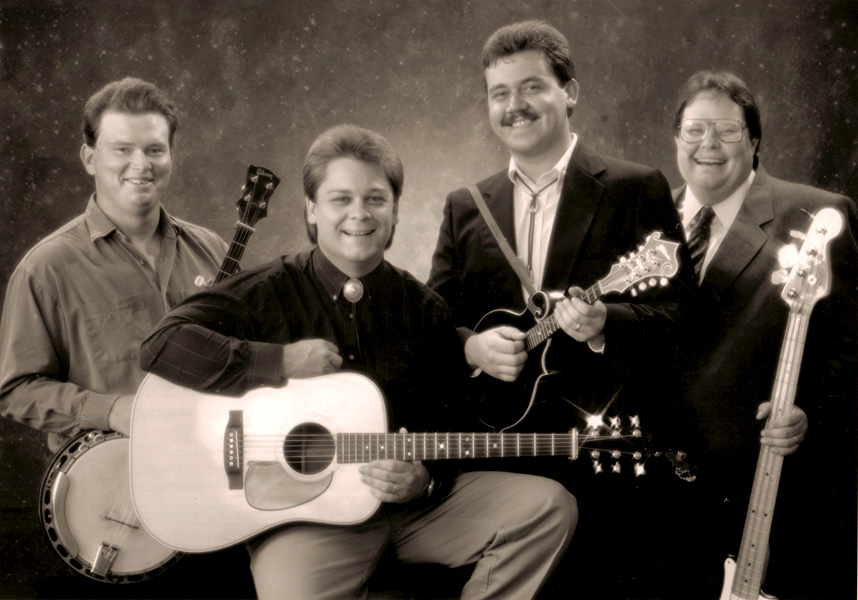
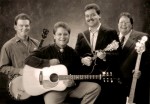 I first met Tim Austin in late 1978, or early ’79, while he was traveling with the Bluegrass Cardinals. Tim was a young musician getting his start selling The Cardinals’ records, tapes, and merchandise at their live performances.
I first met Tim Austin in late 1978, or early ’79, while he was traveling with the Bluegrass Cardinals. Tim was a young musician getting his start selling The Cardinals’ records, tapes, and merchandise at their live performances.
They had rolled into town on a Saturday afternoon for a show at The Rose Garden Inn, then a popular bluegrass music hotspot, near Hurricane, West Virginia.
Though I didn’t suspect it at the time, this meeting turned out to be a propitious one for my career. I had come up there to pitch my song, The Old Man In The Shanty, to Dave Parmley. Tim was sitting there when I sang the song to Dave.
Turned out that Parmley really liked the song and asked me to send it to him, but for some reason I never did. Call it fate, but for whatever reason I didn’t send him the song.
Not long after this first meeting I received a phone call from Tim saying that he was in the process of recording an album with his new group, The Lonesome River Band. He asked me to send that song I had pitched to Dave, because he liked the song as well, and had hoped to record it. I remember asking him what label he was recording for, and he told me that he was independently producing and releasing the project.
Being a little arrogant, I guess, I told Tim to call me when he got on a label. Thinking back on it now, if I had been him I would have said the heck with you, and probably used a bit saltier language. But he just said OK.
Then about a year later I received another call from Tim saying that he had just signed a deal with Rebel Records, and if I would be agreeable, he would sure like to record it for the new release.
I promptly sent the song to him, because it had always been a dream of mine to have a song recorded on the Rebel label. I looked at this as a way to get my foot in the door, so to speak. The song quickly became one of the LRB’s most requested numbers, to my good fortune as a song writer, and was the beginning of a 30+ year friendship and musical relationship that has endured to this day.
Tim and LRB followed up with the next Rebel Release called Saturday Night/Sunday Morning that featured another song that I penned called It Won’t Be Like Cheating. Then they recorded a song written by my wife Sandy Green, my good friend, Richard Bird, and myself called If I Could Only Have Your Love on the breakthrough Rebel album, Looking For Yourself.
 In late 1989 just after recording the Looking For Yourself LP was completed – and due to be released in January of 1990 – I received a call from Tim. Jerry McMillan, original bass player for LRB, had decided to leave the band to pursue other ventures, and Tim asked me if I would come to Virginia and join the band.
In late 1989 just after recording the Looking For Yourself LP was completed – and due to be released in January of 1990 – I received a call from Tim. Jerry McMillan, original bass player for LRB, had decided to leave the band to pursue other ventures, and Tim asked me if I would come to Virginia and join the band.
I jumped at the chance to make my living playing the music I loved. The band members at that time were Tim, Dale Perry – who I knew because our paths had crossed a few times as Dale was also from WV – and Dan Tyminski a young artist that I had the feeling was destined to become a star in this business.
My friends and relatives told me I was crazy to give up a good paying job to chase a dream, but I picked up and moved my wife Sandy and myself to Roanoke, Virginia. It was a good move for us at the time because Sandy’s mom lived in Roanoke and was in failing health, so we got to spend a lot of time with her.
Tim also asked me to be a part of the band business selling merchandise, along with booking the group for the upcoming 1990 season, as a way to make extra income. I worked hard and it paid off for the group because we landed jobs in California and Canada, exposing LRB to brand new audiences.
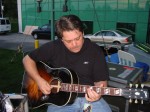 I remember before the Canada dates that Tim’s wife Debbie was expecting their second child, and was due to deliver while we were on the road. Debbie wasn’t about to stand for this, so she and her doctor decided to induce labor early. Everything worked out fine because the day before we were to leave Debbie gave birth to Seth Austin, a bouncing baby boy. I was there with Tim as he paced the halls of the hospital, but he says that I paced more. Sandy tells me that we were both pacing around in circles, and wore out a path in the waiting room.
I remember before the Canada dates that Tim’s wife Debbie was expecting their second child, and was due to deliver while we were on the road. Debbie wasn’t about to stand for this, so she and her doctor decided to induce labor early. Everything worked out fine because the day before we were to leave Debbie gave birth to Seth Austin, a bouncing baby boy. I was there with Tim as he paced the halls of the hospital, but he says that I paced more. Sandy tells me that we were both pacing around in circles, and wore out a path in the waiting room.
I worked out the rest of the summer with LRB and then that fall Dale and I left the group at the same time. We were replaced by Ronnie Bowman and Sammy Shelor, forming what in my humble opinion has become the best version of the Lonesome River Band. Tim toured with them for another 3 or 4 years before giving up the road life to devote full time to his studio, and start up of a new record label called Doobie Shea Records located in Ferrum Virginia.
Being the perfectionist that Tim has become well known for, the very first project to come from the Doobie Shea Label was the critically acclaimed Stanley Tradition project that was nominated for both Grammy and IBMA awards.
Tragedy struck right after the release of this first album with the much documented fire that destroyed Doobie Shea Studios. I was there the day after the fire while the ashes were still smoldering, and I couldn’t believe what I was hearing from Tim. He was already making plans to rebuild. Most people would be licking their wounds looking for sympathy, but not Tim Austin.
Tim promptly sold the existing property in Ferrum and rebuilt the studio on ten beautiful acres in nearby Boones Mill. The new studio was state of the art, and Tim continued to produce award winning projects for his new label including Dan Tyminski’s Carry Me Across The Mountain, a Dale Ann Bradley project, a Marty Raybon release, and a follow up Stanley Gospel Tradition CD just to name a few.
Things were going great for Tim and then the unthinkable happened again. Their largest distributor folded which started a cascade of financial problems that ultimately caused the demise of the label. Again, most people would be crying in their beer, but not our Tim.
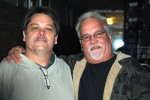 He decided that he would move to Nashville and see what he could do there, and it didn’t take long for Tim to make his presence known. When the word got out that he was in Nashville, he quickly landed a part time job with the Grand Ole Opry doing sound, and working on the Friday and Saturday night shows. He also landed a tour with James Taylor doing the monitor sound. Tim has also been Sound engineer with Ricky Skaggs, Road Manager and sound engineer for the Dan Tyminski Band, and is presently enjoying his Sound Engineer/Road Managing job with Confederate Railroad.
He decided that he would move to Nashville and see what he could do there, and it didn’t take long for Tim to make his presence known. When the word got out that he was in Nashville, he quickly landed a part time job with the Grand Ole Opry doing sound, and working on the Friday and Saturday night shows. He also landed a tour with James Taylor doing the monitor sound. Tim has also been Sound engineer with Ricky Skaggs, Road Manager and sound engineer for the Dan Tyminski Band, and is presently enjoying his Sound Engineer/Road Managing job with Confederate Railroad.
On October 1, 2011, I was pleased to catch up with Tim at the Kentucky Apple Festival in Paintsville KY. I was there with his invitation to see the Confederate Road show and watch Tim at work. I met all the members of the band and while talking to Danny Shirley, their long time leader, he told me: “I feel so lucky to have Tim with us, he is a perfectionist.”
Not exactly news to me. It’s something I’ve known for years.
Tim has always been curious as to what makes things work. His Dad, Curtis Austin, told me that when Tim was very young, He bought Tim a drum set. Curtis said, “He beat on those drums night and day, it liked to drove me and his Mom crazy. Then when I’d had all I could stand, I came into the room one day and laid my pocket knife down on the counter and said wonder what’s in those drums? I walked in a little later and Tim had cut all the drum heads out to see what was in there.”
He looked at me, grinned and said, “Peace and quiet again.”
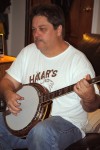
Everyone that is familiar Tim, or has heard him play, knows that he is one of the best bluegrass guitar players in the business. Most folks don’t know that his first instrument is banjo, and that he started out playing banjo locally with a bluegrass band in the Danville VA area. He is also an accomplished bass player.
Tim Austin’s love for bluegrass music hasn’t changed. On recent visit to Nashville I pulled up into his driveway, heard the distinct sound of a banjo coming out of his garage, walked in and there was Tim picking away. He looked up at me and said, “Come on in Bucky. I’m just practicin’. ”
Tim is a prime example as to what firm convictions and focused hard work can accomplish. He has never given up when things were at their bleakest and he has never forsaken his first musical love. As a courtesy to me, he came to the Jim & Valerie Gabehart showcase at IBMA 2011 and ran sound for us.
Tim has a host of friends and fans in the bluegrass world. What better testament could you hope to achieve to what an honest, hard working man he is.
I am proud to call Tim one of my best friends, and I wish him the best of luck in all of his future endeavors.







